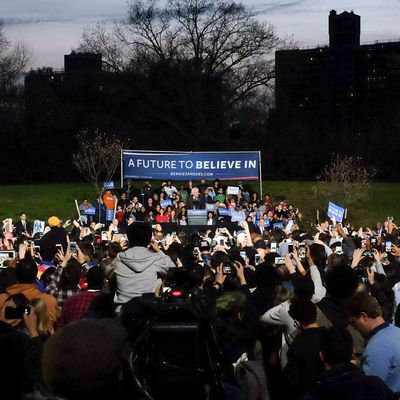
As the competitive phase of the Democratic presidential primary has wound down, the action now moves to the nebulous contest to define the terms of Hillary Clinton’s victory and what, if anything, she owes to Bernie Sanders. It is a little strange, as Ed Kilgore points out, that the coverage of this question treats Sanders as the victor and Clinton as the vanquished. The discussion hinges on the premise that Sanders, even while losing the fight for delegates, has won the war of ideas within the party. The premise is shared by such disparate figures as economically moderate Matthew Yglesias (“Sanders’s basic vision of a party with a more sharply ideological message on economic issues is very likely to dominate in the future”) and ecstatic radical Corey Robin, who sees in Sanders’s success the rise of socialism that will sweep liberalism into the dustbin of history. But this assumes that Sanders’s appeal was mostly or even entirely ideological. That is probably wrong.
It is certainly true that Sanders pushed the debate leftward, by bringing previously marginal left-wing ideas into the Democratic discussion. It is also true that his disproportionately young supporters lie farther to the left than Clinton’s, and that his ideas account for at least some of his enthusiastic support. But to understand the Sanders campaign as primarily a demand for more radical economic policies misses a crucial source of his appeal: as a candidate of good government.
American liberalism contains a long-standing tradition, dating back to the Progressive Era, of disdain for the grubby, transactional elements of politics. Good-government liberals prefer candidates who make high-minded appeals to the greater good, rather than transactional appeals to self-interest. The progressive style of politics was associated with the middle-class reformers and opposition to urban machines, and was especially fixated with rooting out corruption in politics. Candidates who have fashioned themselves in this earnest style have included Adlai Stevenson, Eugene McCarthy, George McGovern, Jimmy Carter, Gary Hart, Jerry Brown, Howard Dean, and Barack Obama. These candidates often have distinct and powerful issue positions, but their appeal rests in large part on the promise of a better, cleaner, more honest practice of politics and government.
Sanders has tapped effectively into this tradition. His disdain for corporate donations, disheveled appearance, frequent disavowals of personal attacks (“People are sick and tired of hearing about your damn emails!”), and pleas to conduct the campaign as an elevated issues seminar have lent him a rare authenticity. This has been aided by the fact that Clinton is unusually vulnerable to a good-government candidate. Through a combination of her husband’s scandals, her own missteps, and a hostile news media, Clinton has labored under the buildup of years of toxic coverage. Obama effectively attacked her on these themes eight years ago, and in 2015 her campaign began under the clouds of new scandals around her buckraking and misuse of a private email server. Polls of Democratic voters showed Sanders crushing her on perceptions of being honest and trustworthy.
The Wisconsin primary is indicative. Fifty-four percent of Democrats said they wanted a candidate who would continue President Obama’s policies, while only 31 percent of voters preferred more liberal policies. (This measure is itself imprecise, since Obama would also prefer more liberal policies, except the Republican Congress is blocking them.) But almost 90 percent of Democrats called Sanders honest and trustworthy, versus 57 percent who said the same about Clinton. Sanders won Wisconsin by 13 points.
Sanders has certainly benefited from and encouraged the spread of radical policies on the left. But the media attention to these ideas has magnified their real-world constituency. A faction is not close to taking majority control of a party before it is able to win at least a sizable minority share of the party’s elected officeholders. When Barry Goldwater led an insurgency to win the Republican nomination in 1964, the conservatives who supported him represented an important faction within the party, with representatives in both houses of Congress. Within the Democratic Party, on the other hand, socialists — depending on how you define it — are limited to Sanders himself. Sandersism may one day become the Democratic mainstream creed, but that day is probably a long way off.
Now Watch: 4 Times Bernie Sanders Was Ahead of the Pack on Key Issues






























